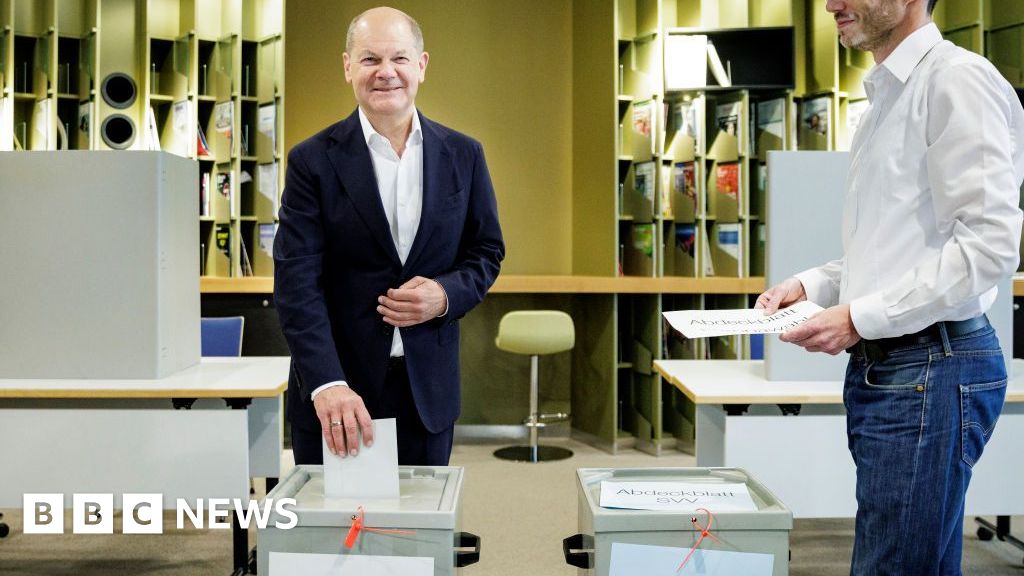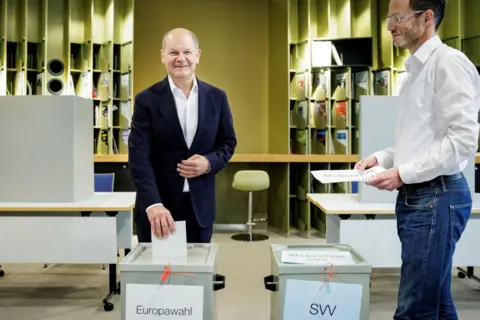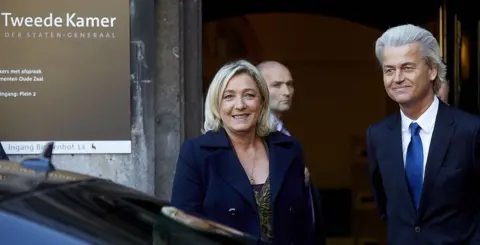
 Getty Images
Getty ImagesWhile much of the European election reaction has focussed on French President Emmanuel Macron’s bombshell snap election announcement after the far-right National Rally won there, parties in other countries across the EU have been considering their gains and losses.
Although far-right and nationalist parties have made gains, the centre-right also performed well, holding its position as the largest grouping and managing to gain seats.
Centre-right parties came out top in Germany, Greece, Poland and Spain, and made significant advances in Hungary.
Here are some key takeaways from our correspondents around Europe.
Germany coalition suffers losses but no snap election
Damien McGuinness in Berlin
It has been a sorry sight for Germany’s three-party coalition government, but unlike Emmanuel Macron, Chancellor Olaf Scholz says he will not call for an election.
The alliance between the Social Democrats, Greens and liberals was already tricky, but Russia’s invasion of Ukraine meant breaking economic and energy ties with Russia and renouncing former pacifist feelings.
This alienated some core supporters, created party rifts, and overall rattled voters. A huge surge in migration has also put strain on the resources of local councils.
While the government has managed to boost military spending and pivot away from cheaper Russian energy, it means money is tight.
Step in the populist far-right and far-left, who promise a quick return to peace and prosperity: “Just negotiate with Putin, and buy Russian gas again,” says the far-right Alternative for Germany (AfD).
AfD came second with 15.9% and Scholz’s social democratic SPD came third with 13.9%. Coming up top was the conservative CDU party with an impressive 30% of the vote.
“We want to end the war so just stop sending arms to Ukraine and stop migrants coming,” says the new populist far-left party BSW led by ex-communist firebrand Sahra Wagenknecht.
Most German voters and politicians believe dealing with Moscow and migration is not that straightforward, and a majority in Germany support Ukraine.
But in times of insecurity and uncertainty, simple messages are seductive.
Italy’s PM made the vote about her – and it paid off
 Getty Images
Getty ImagesLaura Gozzi in Rome
Italian Prime Minister Giorgia Meloni has cemented her grip on Italian politics.
She used the European elections to boost her own popularity by putting her name at the top of her party’s ballot, and it proved a successful gamble: with 29%, she has increased the vote gained by her party in the 2022 general election.
But there is another success story in Italy. The opposition centre-left Democratic Party (PD) performed better than hoped, with 24% of the vote – its highest result since 2014.
The result will boost the PD and lend credibility to its leader, Elly Schlein, who has seemingly managed to find her footing after just over a year at the helm of the country’s biggest opposition party.
Smaller parties in the governing coalition will have some thinking to do. Forza Italia – the party founded by late media tycoon Silvio Berlusconi – won slightly more votes than the once-mighty and now floundering League party, headed by Matteo Salvini.
Even the League’s founder, Umberto Bossi, declared he would vote for Forza Italia to signal his discontent at the direction the League has taken. Two centrist parties – one led by former PM Matteo Renzi – failed to hit the threshold required to send MEPs to the European Parliament.
But despite these internal going-ons, Italy has, rather unusually, emerged from the European elections as a pretty stable country – much more so, in any case, than some of its neighbours.
Dutch gains for Green-left and far-right
 Getty Images
Getty ImagesAnna Holligan in The Hague
Last November, anti-immigration Freedom Party (PVV) leader – and long-time Marine Le Pen ally – Geert Wilders won a shock victory in the Netherlands’ national election.
The EU election predictions suggest the public sentiment hasn’t changed much since then.
The headlines: Green-Left parties secured the most seats, while the Freedom Party made the greatest gains.
The nuances: Centre-right parties had a strong showing.
Dutch and EU political veteran Frans Timmermans said: “This shows that a majority in the Netherlands wants to strengthen Europe and certainly not destroy it.”
While Geert Wilders – who until recently promised a referendum on Nexit (i.e. Netherlands’ exit from the EU) – posted five red love heart emojis on X. “Still the biggest winner with five more seats.”
Interestingly, the biggest celebrations I witnessed in the parliament bar last night were being held by two relative newcomers, at opposite ends of the political spectrum.
Pro-EU Volt (from none to two MEPs) cheered and toasted beneath an archway of blue and yellow balloons.
While outside the revolving doors, the unmistakable Farmer Citizen Movement leader Caroline van der Plas was taking in some fresh air alongside the party’s new MEP Jessika van Leeuwen.
Both were initially predicted to gain two MEPs, although the latest prediction suggests BBB will win just one.
Hungary sees a new opposition appear
Nick Thorpe in Budapest
In Hungary, Viktor Orban’s Fidesz party won both the European and municipal elections.
But the real victory of the night went to Peter Magyar, a 43-year-old lawyer whose centre-right Tisza party replaced the old opposition.
Fidesz got 44% and Tisza 30%. Tisza was created just three months ago. They will have 7 MEPs, to 11 for Fidesz, and will apply to join the European People’s Party grouping in the European Parliament.
“We defeated the old and the new opposition,” Viktor Orban consoled his supporters.
But in practice the political system he built, in which Fidesz acts as a “central force field” in which several other small, ineffective parties have to operate, is over.
Far-right party claims ‘new era’ in Austria
 Getty Images
Getty ImagesBethany Bell in Vienna
The Freedom Party (FPÖ) leader, Herbert Kickl, has told a crowd of cheering supporters that his party’s victory in the European elections marked “a new era in politics”.
And the next step, he said, is the chancellery.
Austria will hold parliamentary elections in the autumn. Neither of the past two leaders of FPÖ, Hans Christian Strache or Jörg Haider, were able to deliver first-place for their party. But now the party is feeling confident.
Writing in the centre left-leaning Der Standard newspaper, editor-in-chief Gerold Riedmann said the FPÖ had become a melting pot of people who have “concerns about migration; who don’t think Putin is all that bad; who felt humiliated by vaccination and coronavirus; who think climate protection is unnecessary; and who simply want to teach everyone a lesson”.
With most of the votes counted, the FPÖ won 25.7% of the vote, just ahead of the conservative People’s Party at 24.7%. The Social Democrats got 23.3%, the Greens 10.9%, the liberal Neos 10.1%.



